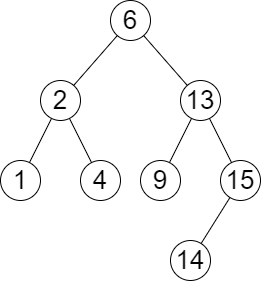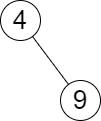Welcome to Subscribe On Youtube
2476. Closest Nodes Queries in a Binary Search Tree
Description
You are given the root of a binary search tree and an array queries of size n consisting of positive integers.
Find a 2D array answer of size n where answer[i] = [mini, maxi]:
miniis the largest value in the tree that is smaller than or equal toqueries[i]. If a such value does not exist, add-1instead.maxiis the smallest value in the tree that is greater than or equal toqueries[i]. If a such value does not exist, add-1instead.
Return the array answer.
Example 1:

Input: root = [6,2,13,1,4,9,15,null,null,null,null,null,null,14], queries = [2,5,16] Output: [[2,2],[4,6],[15,-1]] Explanation: We answer the queries in the following way: - The largest number that is smaller or equal than 2 in the tree is 2, and the smallest number that is greater or equal than 2 is still 2. So the answer for the first query is [2,2]. - The largest number that is smaller or equal than 5 in the tree is 4, and the smallest number that is greater or equal than 5 is 6. So the answer for the second query is [4,6]. - The largest number that is smaller or equal than 16 in the tree is 15, and the smallest number that is greater or equal than 16 does not exist. So the answer for the third query is [15,-1].
Example 2:

Input: root = [4,null,9], queries = [3] Output: [[-1,4]] Explanation: The largest number that is smaller or equal to 3 in the tree does not exist, and the smallest number that is greater or equal to 3 is 4. So the answer for the query is [-1,4].
Constraints:
- The number of nodes in the tree is in the range
[2, 105]. 1 <= Node.val <= 106n == queries.length1 <= n <= 1051 <= queries[i] <= 106
Solutions
Solution 1: In-order Traversal + Binary Search
Since the problem provides a binary search tree, we can obtain a sorted array through in-order traversal. Then for each query, we can find the maximum value less than or equal to the query value and the minimum value greater than or equal to the query value through binary search.
The time complexity is $O(n + m \times \log n)$, and the space complexity is $O(n)$. Here, $n$ and $m$ are the number of nodes in the binary search tree and the number of queries, respectively.
-
/** * Definition for a binary tree node. * public class TreeNode { * int val; * TreeNode left; * TreeNode right; * TreeNode() {} * TreeNode(int val) { this.val = val; } * TreeNode(int val, TreeNode left, TreeNode right) { * this.val = val; * this.left = left; * this.right = right; * } * } */ class Solution { private List<Integer> nums = new ArrayList<>(); public List<List<Integer>> closestNodes(TreeNode root, List<Integer> queries) { dfs(root); List<List<Integer>> ans = new ArrayList<>(); for (int x : queries) { int i = Collections.binarySearch(nums, x + 1); int j = Collections.binarySearch(nums, x); i = i < 0 ? -i - 2 : i - 1; j = j < 0 ? -j - 1 : j; int mi = i >= 0 && i < nums.size() ? nums.get(i) : -1; int mx = j >= 0 && j < nums.size() ? nums.get(j) : -1; ans.add(List.of(mi, mx)); } return ans; } private void dfs(TreeNode root) { if (root == null) { return; } dfs(root.left); nums.add(root.val); dfs(root.right); } } -
/** * Definition for a binary tree node. * struct TreeNode { * int val; * TreeNode *left; * TreeNode *right; * TreeNode() : val(0), left(nullptr), right(nullptr) {} * TreeNode(int x) : val(x), left(nullptr), right(nullptr) {} * TreeNode(int x, TreeNode *left, TreeNode *right) : val(x), left(left), right(right) {} * }; */ class Solution { public: vector<vector<int>> closestNodes(TreeNode* root, vector<int>& queries) { vector<int> nums; function<void(TreeNode*)> dfs = [&](TreeNode* root) { if (!root) { return; } dfs(root->left); nums.push_back(root->val); dfs(root->right); }; dfs(root); vector<vector<int>> ans; int n = nums.size(); for (int& x : queries) { int i = lower_bound(nums.begin(), nums.end(), x + 1) - nums.begin() - 1; int j = lower_bound(nums.begin(), nums.end(), x) - nums.begin(); int mi = i >= 0 && i < n ? nums[i] : -1; int mx = j >= 0 && j < n ? nums[j] : -1; ans.push_back({mi, mx}); } return ans; } }; -
# Definition for a binary tree node. # class TreeNode: # def __init__(self, val=0, left=None, right=None): # self.val = val # self.left = left # self.right = right class Solution: def closestNodes( self, root: Optional[TreeNode], queries: List[int] ) -> List[List[int]]: def dfs(root: Optional[TreeNode]): if root is None: return dfs(root.left) nums.append(root.val) dfs(root.right) nums = [] dfs(root) ans = [] for x in queries: i = bisect_left(nums, x + 1) - 1 j = bisect_left(nums, x) mi = nums[i] if 0 <= i < len(nums) else -1 mx = nums[j] if 0 <= j < len(nums) else -1 ans.append([mi, mx]) return ans -
/** * Definition for a binary tree node. * type TreeNode struct { * Val int * Left *TreeNode * Right *TreeNode * } */ func closestNodes(root *TreeNode, queries []int) (ans [][]int) { nums := []int{} var dfs func(*TreeNode) dfs = func(root *TreeNode) { if root == nil { return } dfs(root.Left) nums = append(nums, root.Val) dfs(root.Right) } dfs(root) for _, x := range queries { i := sort.SearchInts(nums, x+1) - 1 j := sort.SearchInts(nums, x) mi, mx := -1, -1 if i >= 0 { mi = nums[i] } if j < len(nums) { mx = nums[j] } ans = append(ans, []int{mi, mx}) } return } -
/** * Definition for a binary tree node. * class TreeNode { * val: number * left: TreeNode | null * right: TreeNode | null * constructor(val?: number, left?: TreeNode | null, right?: TreeNode | null) { * this.val = (val===undefined ? 0 : val) * this.left = (left===undefined ? null : left) * this.right = (right===undefined ? null : right) * } * } */ function closestNodes(root: TreeNode | null, queries: number[]): number[][] { const nums: number[] = []; const dfs = (root: TreeNode | null) => { if (!root) { return; } dfs(root.left); nums.push(root.val); dfs(root.right); }; const search = (x: number): number => { let [l, r] = [0, nums.length]; while (l < r) { const mid = (l + r) >> 1; if (nums[mid] >= x) { r = mid; } else { l = mid + 1; } } return l; }; dfs(root); const ans: number[][] = []; for (const x of queries) { const i = search(x + 1) - 1; const j = search(x); const mi = i >= 0 ? nums[i] : -1; const mx = j < nums.length ? nums[j] : -1; ans.push([mi, mx]); } return ans; } -
/** * Definition for a binary tree node. * public class TreeNode { * public int val; * public TreeNode left; * public TreeNode right; * public TreeNode(int val=0, TreeNode left=null, TreeNode right=null) { * this.val = val; * this.left = left; * this.right = right; * } * } */ public class Solution { private List<int> nums = new List<int>(); public IList<IList<int>> ClosestNodes(TreeNode root, IList<int> queries) { Dfs(root); List<IList<int>> ans = new List<IList<int>>(); foreach (int x in queries) { int i = nums.BinarySearch(x + 1); int j = nums.BinarySearch(x); i = i < 0 ? -i - 2 : i - 1; j = j < 0 ? -j - 1 : j; int mi = i >= 0 && i < nums.Count ? nums[i] : -1; int mx = j >= 0 && j < nums.Count ? nums[j] : -1; ans.Add(new List<int> {mi, mx}); } return ans; } private void Dfs(TreeNode root) { if (root == null) { return; } Dfs(root.left); nums.Add(root.val); Dfs(root.right); } }